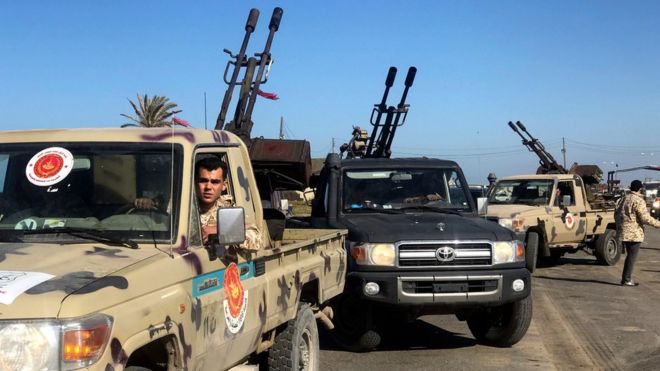 AFP
AFP
Fresh fighting has flared near the Libyan capital, Tripoli, between pro-government forces and rebel fighters from the east of the country.
Reports say rebel forces loyal to Khalifa Haftar are in three areas near the outskirts of the city.
Tripoli is the base of the UN-backed and internationally recognised government.
The UN's Libya envoy has insisted that a planned conference on possible new elections will still go ahead.
UN troops in the capital have been placed on high alert.
Libya has been torn by violence and political instability since long-time ruler Muammar Gaddafi was deposed and killed in 2011.
What's happening on the ground?
General Haftar - who was appointed chief of the Libyan National Army (LNA) under an earlier UN-backed administration - ordered his forces to advance on Tripoli on Thursday, as UN Secretary General Antonio Guterres was in the city to discuss the ongoing crisis.
They have been fighting in several areas, including near the disused international airport south of Tripoli.
The LNA said it had been targeted by air strikes to the south of Tripoli by a plane that had taken off from Misrata. Pro-government forces in Tripoli said they had launched "intensive strikes".
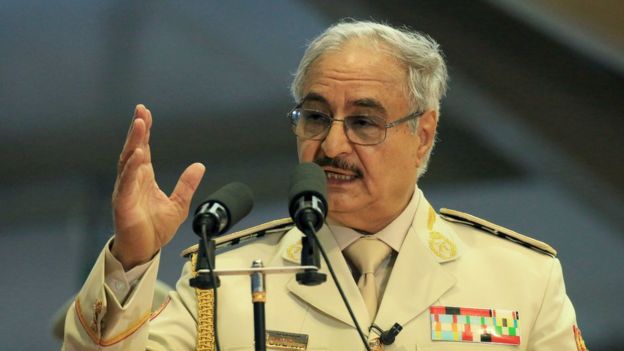 AFP
AFP
Gen Haftar spoke to Mr Guterres in Benghazi on Friday, and reportedly told him that his operation would not stop until his troops had defeated "terrorism".
Tripoli residents have begun stocking up on food and fuel, AFP reported.
LNA troops seized the south of Libya and its oil fields earlier this year.
What's been the reaction?
The G7 group of major industrial nations has urged all parties "to immediately halt all military activity". The UN Security council has issued a similar call.
Russia has also called on parties in the escalating conflict to find an agreement.
Speaking in Egypt, Russian foreign minister Sergei Lavrov also warned against what he called foreign meddling in Libya.
Russia and Egypt have provided support to Gen Haftar.
UN envoy Ghassan Salame said on Saturday that the conference planned for 14-16 April would still be held in time, despite the escalation - "unless compelling circumstances force us not to".

Hope dashed for a political resolution?
By Sebastian Usher, BBC Arab affairs editor
It's still unclear how much this is a show of force to bolster Gen Haftar's position or a genuine effort to seize Tripoli.
He returned during the revolution and he's subsequently become the most powerful military leader in a country rife with militias, allied to a rival government in the east.
Despite the chorus of international concern over his actions, he has had support from powerful outside players, including the UAE and Egypt.
Efforts towards a political resolution for Libya have foundered time after time. The most recent hopes may once again have been dashed.

Who is Khalifa Haftar?
Born in 1943, the former army officer helped Colonel Muammar Gaddafi seize power in 1969 before falling out with him and going into exile in the US. He returned in 2011 after the uprising against Gaddafi began and became a rebel commander.
In December Haftar met Prime Minister Fayez al-Serraj from the UN-backed government at a conference but refused to attend official talks.
He visited Saudi Arabia last week, where he met King Salman and Crown Prince Mohammed bin Salman for talks.
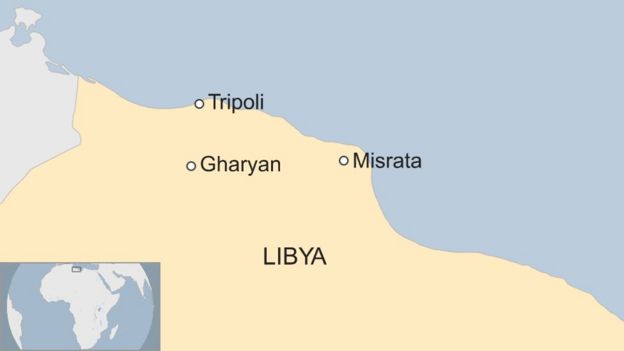
Africa
Sudan protesters reach army headquarters
- 6 April 2019
- Africa
Mummified mice found in Egyptian tomb
- 6 April 2019
- Middle East
US admits civilian drone strike deaths
- 5 April 2019
- Africa

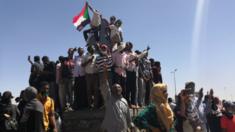
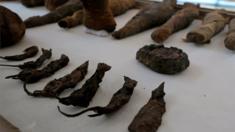
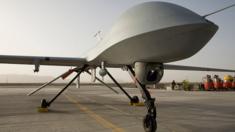

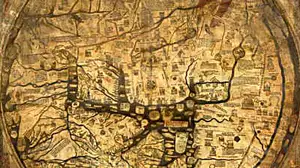


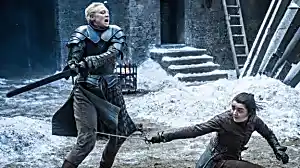

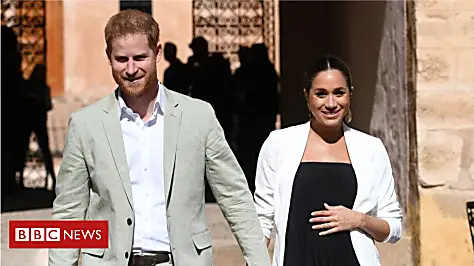

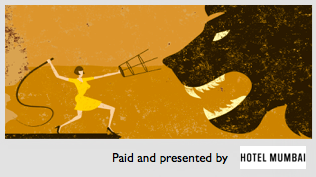



![[Gallery] Photographs From the Battlefields of World War 2 [Gallery] Photographs From the Battlefields of World War 2](https://images.outbrainimg.com/transform/v3/eyJpdSI6ImU2ZTZiZDIwZGNhODQ0YWMyNzYxYWY4ZWIyYTRkZWE4Y2FkNTE0OTdkNjUxM2I5OTczZjlmYzE2YzI1NTY5NzEiLCJ3IjoxNjAsImgiOjkwLCJkIjoxLjUsImNzIjowLCJmIjo0fQ.webp)





No comments:
Post a Comment